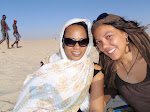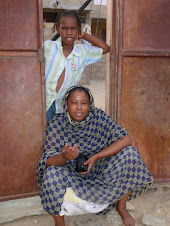Saturday, October 13, 2007
Potholes
October 7, 2007
Belize City was built on a swamp. It gurgles and spits under the heat while frogs flourish and band together to create the night’s raucous symphony. Yet, it doesn’t sink into the muck. Sophisticated systems of boards and moats and standing pools of water surround the streets and curbs. Tadpoles and small fish dart about the murky water and children play with sticks in the side-street ponds. The city somehow remains wet and dry simultaneously. Streets are quick to deteriorate under such circumstances, and these gravel roads welcome erosion.
“You betah watch out for dem craters!” a Belizean woman once said laughing as she shook her head, “deh no potholes honey, deh craters!”
The roads are not the only things deteriorating in this swampy city. I recently went out on the streets with some of the UNICEF staff to talk to children about how safe they felt living in Belize. Their feelings of safety were just like the roads, broken and unstable. I felt the lump in my throat swell with each interview.
Their bright smiles and embarrassed beginnings faded into serious and persistent answers as we questioned them. These kids, from 6 to 18, are overly-mature and startlingly aware of the state of their country. They don’t feel safe in Belize. They don’t feel safe because of the rising crime rate, the large number of teenage pregnancies, the reality of HIV/AIDS, the potholed streets and the lack of job opportunities, to name a few.
“What about living in Belize makes you feel unsafe?” My colleague asked a young girl no older than 10.
“The Crime. My poppa just got shot last week.” She said.
Now, these streets are not constantly zinging with bullets. But there are areas that are not safe at night. Gangs are increasing in size and power. The newspapers bring stories of drive by’s on bikes and bullet ridden bodies rushed to hospitals. When we asked these kids why they thought the crime was so bad, they would sigh and shrug and say that there was ‘Not Enough’. They said there were not enough activities after school, not enough parent involvement, not enough decent police men and women. And there was also ‘Too Much’. Too much peer pressure leading to unsafe sex, too much drug use, too much fighting at schools when teachers stepped out into the hallway.
They know. Their minds are ticking and churning. They reek of potential. They just have to be pointed in the right direction so they can use it. And that’s just the problem. How DO we do that?
That’s when you start to feel small and overwhelmed. It seems impossible to directly help these kids. The work we did that day will be packaged into a tight presentation and delivered to a room of people that have all the problems of the Caribbean grinding on minds. No matter how desperate and desolate the situation, it’s a matter of proving one problem more deplorable than the other.
Sometimes these problems are given attention and they have a moment where the spotlight is shone on them. For the potholed roads, this moment comes before elections. With the elections around the corner the roads will be smoother. People United Party and United Democrat Party will go on a spree of improving the city to improve the number of votes they get. While everyone is grateful, they know that the paved holes in the roads are only temporary. They are fixed quickly and unprofessionally, soon to fall victim to another rainstorm and open up even more gaping then before.
A program can be launched in the name of the children, looking new and hopeful, gleaming with possibilities. But, with lack of funding and human resources, these programs fall through and kids see another failed attempt at making their lives more livable.
“Too Much” and “Not Enough” are frustrating. They usually go hand in hand and continually add to each other’s lists. It’s a slap in the face to see the realness of things, but instead of giving into problems and disappointments, you have to try again. I am humbled by the amount of organizations in Belize trying to make a difference, and I hope that they are successful. One step after another, slow and steady. The video of kid’s speaking their minds will flow into an audience during the presentation and hopefully, flick a switch in someone’s head. Everything matters in the end.
Belize City was built on a swamp. It gurgles and spits under the heat while frogs flourish and band together to create the night’s raucous symphony. Yet, it doesn’t sink into the muck. Sophisticated systems of boards and moats and standing pools of water surround the streets and curbs. Tadpoles and small fish dart about the murky water and children play with sticks in the side-street ponds. The city somehow remains wet and dry simultaneously. Streets are quick to deteriorate under such circumstances, and these gravel roads welcome erosion.
“You betah watch out for dem craters!” a Belizean woman once said laughing as she shook her head, “deh no potholes honey, deh craters!”
The roads are not the only things deteriorating in this swampy city. I recently went out on the streets with some of the UNICEF staff to talk to children about how safe they felt living in Belize. Their feelings of safety were just like the roads, broken and unstable. I felt the lump in my throat swell with each interview.
Their bright smiles and embarrassed beginnings faded into serious and persistent answers as we questioned them. These kids, from 6 to 18, are overly-mature and startlingly aware of the state of their country. They don’t feel safe in Belize. They don’t feel safe because of the rising crime rate, the large number of teenage pregnancies, the reality of HIV/AIDS, the potholed streets and the lack of job opportunities, to name a few.
“What about living in Belize makes you feel unsafe?” My colleague asked a young girl no older than 10.
“The Crime. My poppa just got shot last week.” She said.
Now, these streets are not constantly zinging with bullets. But there are areas that are not safe at night. Gangs are increasing in size and power. The newspapers bring stories of drive by’s on bikes and bullet ridden bodies rushed to hospitals. When we asked these kids why they thought the crime was so bad, they would sigh and shrug and say that there was ‘Not Enough’. They said there were not enough activities after school, not enough parent involvement, not enough decent police men and women. And there was also ‘Too Much’. Too much peer pressure leading to unsafe sex, too much drug use, too much fighting at schools when teachers stepped out into the hallway.
They know. Their minds are ticking and churning. They reek of potential. They just have to be pointed in the right direction so they can use it. And that’s just the problem. How DO we do that?
That’s when you start to feel small and overwhelmed. It seems impossible to directly help these kids. The work we did that day will be packaged into a tight presentation and delivered to a room of people that have all the problems of the Caribbean grinding on minds. No matter how desperate and desolate the situation, it’s a matter of proving one problem more deplorable than the other.
Sometimes these problems are given attention and they have a moment where the spotlight is shone on them. For the potholed roads, this moment comes before elections. With the elections around the corner the roads will be smoother. People United Party and United Democrat Party will go on a spree of improving the city to improve the number of votes they get. While everyone is grateful, they know that the paved holes in the roads are only temporary. They are fixed quickly and unprofessionally, soon to fall victim to another rainstorm and open up even more gaping then before.
A program can be launched in the name of the children, looking new and hopeful, gleaming with possibilities. But, with lack of funding and human resources, these programs fall through and kids see another failed attempt at making their lives more livable.
“Too Much” and “Not Enough” are frustrating. They usually go hand in hand and continually add to each other’s lists. It’s a slap in the face to see the realness of things, but instead of giving into problems and disappointments, you have to try again. I am humbled by the amount of organizations in Belize trying to make a difference, and I hope that they are successful. One step after another, slow and steady. The video of kid’s speaking their minds will flow into an audience during the presentation and hopefully, flick a switch in someone’s head. Everything matters in the end.
Subscribe to:
Post Comments (Atom)





1 comment:
You will make a difference. Often we don't realize the impact of those compassionate moments that you share with others. I know the kids will feel your concern and will know that you really want to find answers to help. I so admire you for being there and working for better lives for the children of Belize.
Deena
Post a Comment